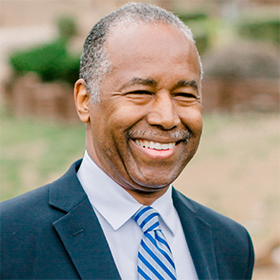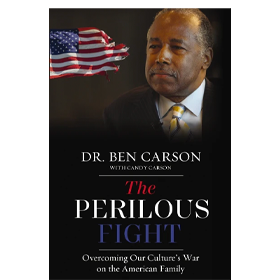
The Significance of The Family

By Dr. Ben Carson
Several years ago, the Brookings Institution—a prestigious and well-funded research organization—reported on the findings from a large-scale study of poverty in the United States. The researchers made an astonishing discovery: 98 percent of American teens who take three simple steps are able to avoid poverty as adults.
What are those three steps?
- Complete at least a high school education.
- Get a full-time job.
- Wait until after marriage to have children.
In other words, young people can greatly increase their chances for economic prosperity if they pursue a traditional approach to growing up and starting a family. Similarly, parents can greatly increase the chances of their children experiencing success in life if they steer those children toward the three steps listed above.
More recently, the Brookings Institution partnered with Princeton University on a report titled “Strong Families, Prosperous States: Do Healthy Families Affect the Wealth of States?” As you can see from the title, that report focused, not on individuals or even individual families, but on how the well-being of families impacts entire states.
The findings were eye-opening, to say the least: “Higher levels of marriage, and especially higher levels of married-parent families, are strongly associated with more economic growth, more economic mobility, less child poverty, and higher median family income at the state level in the United States.”
States with higher levels of traditional families had:
- more wealth (higher median family income)
- more upward mobility (people moving from poverty to wealth)
- less child poverty
- much less violent crime
Most recently, Melissa Kearney—the Neil Moskowitz professor of economics at the University of Maryland—wrote a book in 2023 called The Two-Parent Privilege. The book offers a deep and detailed exploration of what most cultures have already known for centuries—that children raised outside of a traditional family are more likely to suffer harm of various kinds than those within a traditional family.
In Kearney’s words: “I have studied US poverty, inequality, and family structure for almost a quarter of a century. I approach these issues as a hardheaded—albeit softhearted—MIT-trained economist. Based on the overwhelming evidence at hand, I can say with the utmost confidence that the decline in marriage and the corresponding rise in the share of children being raised in one-parent homes has contributed to the economic insecurity of American families, has widened the gap in opportunities and outcomes for children from different backgrounds, and today poses economic and social challenges that we cannot afford to ignore—but may not be able to reverse.”<
The data is clear. When it comes to raising children and securing the economic foundation of a nation for generations, what we call the traditional nuclear family is the most effective tool for generational success ever devised.
God’s Design for the Family
Why is the traditional nuclear family so successful? Why do families with two married parents raising their own children have a higher proclivity for producing successful adult children than nontraditional families?
A lot of people have offered answers to that question, including these:
- Two-parent households are more economically efficient and adaptable than single-parent households.
- Traditional families allow parents to lean on each other and receive support when one of those parents is struggling.
- Traditional families tend to be more childcentric; the structure of the family is built around children rather than adults.
- Both boys and girls live with active role models in a two-parent household.
And there are many more examples.
These reasons are valid. They make sense. But they don’t tell the whole story. Indeed, I would suggest that these and other attempted explanations are symptoms of the traditional family’s success rather than the root cause of that success.
What is the root cause then? The simple reason traditional families are so effective at producing healthy, stable, prosperous human beings is because human beings were designed to grow and mature within the context of traditional families. Children thrive in nuclear families for the same reason birds thrive in nests—they were created to do so. We know that because the Creator of human beings—who is also the Creator of the family—laid out the guidelines for families in the Bible, which is His manual for life.
The book of Genesis lays out the descriptive foundation for the family, starting on the very first page:
So God created man in His own image; in the image of God He created him; male and female He created them. Then God blessed them, and God said to them, “Be fruitful and multiply; fill the earth and subdue it; have dominion over the fish of the sea, over the birds of the air, and over every living thing that moves on the earth.” (Genesis 1:27–28)
You’ll notice that “male and female He created them” involves a binary, which is not a popular concept in today’s world. But I want to focus for now on the truth that human beings are created “in the image of God.” Specifically, that “image” is tied to the binary of “male and female.” Adam wasn’t created in God’s image as a single individual. Rather, Adam and Eve were created in God’s image as two individuals brought together for a purpose: “‘Be fruitful and multiply; fill the earth and subdue it.’”
Remember that God exists as a divine community. He is God the Father, God the Son, and God the Spirit—each of those unique Persons exist together in unity. A living relationship.
Humanity is created in God’s image because we are intended to function as a similar community. We were created by the community called God to live and thrive as a community of individuals, and that community begins with the family.
We see that theme continued in Genesis 2:18: “And the Lord God said, ‘It is not good that man should be alone; I will make him a helper comparable to him.’ ” The King James Version, which is what I studied growing up and still prefer to read, uses the uncommon word helpmeet instead of helper. The literal translation for that word is “a helper like himself.”
It should be noted that God did not take a bone from the foot, signifying that the helper was to be inferior. Nor did He take a piece of the skull to signify that the helper was to be superior. Instead, God created Eve using a rib from Adam’s side, indicating the helper would be an equal who would “help meet” the challenges of their future together.
Several verses later, the text reinforces the purpose for that system:
And Adam said: “This is now bone of my bones And flesh of my flesh; She shall be called Woman,
Because she was taken out of Man.” Therefore a man shall leave his father and mother and be joined to his wife, and they shall become one flesh. (Genesis 2:23–24)
What is the purpose of such a vibrant, intimate community? As already stated, the purpose is to “be fruitful and multiply.” No, procreation is not the only purpose for marriage—but it is a purpose. In fact, it is a primary purpose, and one that should never be ignored.
Scripture affirms the necessary role of children within the family:
Behold, children are a heritage from the Lord, The fruit of the womb is a reward. Like arrows in the hand of a warrior, So are the children of one’s youth. Happy is the man who has his quiver full of them; They shall not be ashamed, But shall speak with their enemies in the gate. (Psalm 127:3–5)
Finally, and critically, the Bible makes it clear that families are designed as permanent institutions. Combining two unique individuals into “one flesh” is not a temporary amalgamation. Marriage is a life-changing, lifelong union between husband and wife.
For that reason, Scripture affirms that divorce was not and is not part of God’s plan for families (see Malachi 2:16; Matthew 5:31–32; and Matthew 19:4–6).
Does that mean a woman suffering physical or emotional abuse must be trapped in a harmful marriage? No, there are commonsense instructions given in Scripture about divorce, and we will cover that topic in greater depth in later chapters. But as a principle, God’s intention was for the union of husband and wife to be permanent—“till death do us part.”
So then, the basic guidelines for families as outlined by our Creator is one man and one woman permanently joined in passion and purpose as one flesh, not for their own fulfillment as individuals, but so that the next generation may also grow and flourish.
That’s marriage. That’s family. That’s the plan given to us by God. And there are harmful consequences for all involved when we deviate from that plan.
Adapted from The Perilous Fight: Overcoming Our Culture’s War on the American Family, by Dr. Ben Carson. Click here to learn more about his book.
Learn from one of our leading conservative voices how we can return to the biblical values our nation was founded upon, especially the vital importance of the family, in order to secure a prosperous future for generations to come.
Does America no longer feel like home? Widespread divorce rates, the erosion of traditional marriage, the popular rise of radical ideologies, attacks on faith, and government interference are only a few of the factors contributing to the struggles of families in our culture. And because of the importance of healthy families to every part of our national life, the breakdown of the family threatens to rob us of the country we love.
Like many of us, Dr. Ben Carson fears we are losing the country we love. In this provocative and ultimately hopeful book, he gives us the facts, inspiration, and theory-to-action answers we need to restore a key foundation of America: the family.
The Perilous Fight equips you to understand:
- The hard data behind the breakdown of the family and its effects on our society, including poverty, crime, and deteriorating education
- The core biblical beliefs that led our nation into unprecedented freedom and prosperity—and why abandoning those beliefs led to the social decline we see today
- The fresh ideas and public policy options that could reverse negative trends impacting the family while maintaining a balance between constitutional freedoms and governmental involvement
This is a practical and inspiring book for anyone who:
- Feels discouraged about the state of our country and its institutions
- Needs hope that there are commonsense, attainable solutions that we all can practice
- Appreciates a conservative, Scripture-based approach to restoring faith, liberty, community, and life in America
Strong families are the cornerstone of strong communities. Strong communities build a strong nation. Only when we prioritize the family as an institution established by God will we proudly remain the land of the free and the home of the brave.
Dr. Benjamin S. Carson has served as the director of pediatric neurosurgery at Johns Hopkins Medical Institutions, a candidate for President of the United States, and the seventeenth Secretary of the Department of Housing and Urban Development. He currently serves as the founder and chairman of the American Cornerstone Institute. He is also the author of six bestselling books: Gifted Hands, Think Big, The Big Picture, One Nation, A More Perfect Union, and Created Equal, the last four of which he coauthored with his wife, Candy. They are the parents of three grown sons and grandparents to eight grandchildren. They live in Palm Beach Gardens, Florida.



